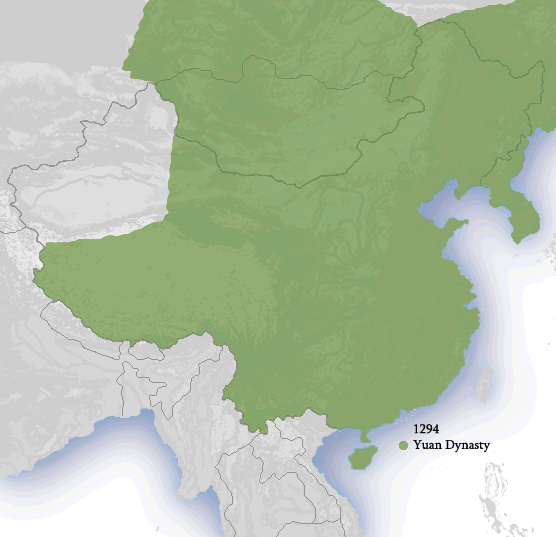For most of Chinese history, China had been a great civilization but not a unified country. Although the Mongols had ruled territories including today’s North China for decades, it was not until 1271 that Khubilai Khan officially proclaimed the dynasty in the traditional Chinese style, and the conquest was not complete until 1279.
With the desire to rule all of China, Khubilai Khan (leader of the Mongolian Borjigin clan) established the Yuan dynasty and became Emperor of China.
Despite the surrender of the Song court, resistance of Song remnants remained. Chinese resistance lasted for a few more years as Song loyalists organized themselves around a powerless boy emperor, brother to the last formal Song emperor. In an attempt to restore the Song dynasty, several Song officials set up a government in Guangdong, aboard ships of the vast Song navy, which still maintained over a thousand ships (which then carried the Song army, which had been forced by the Mongol army off of the land onto these Song warships). Realizing this, in 1279 Khubilai sent his fleet to engage the Song fleet at the battle of Yamen in the waters off of modern Hong Kong, winning a decisive victory in which the last Song Emperor Bing of Song and his loyal officials committed suicide. This was the final major military confrontation of the Mongol conquest of the Song in southern China.
Khubilai as emperor and founder of a new dynasty, sought to make his image not merely more acceptable, but noble to his Chinese subjects. He acknowledged the use of both a strong army and good propaganda. He also sought good administration and policy governing the large Chinese populace, striving to build popular support through efficient govenment and de-emphasis of his foreign origin (Mongol). During his time, the use of paper money was radically expanded to facilitate commerce through the empire, and education was introduced for peasant children, as a way for improving general literacy and living standards.
Khubilai did not pursue short-term popular support, but rather, he pursued a nearly two-decade long policy of winning allegiance of a continental civization. The collapse of the Song dynasty fell apart gradually as Chinese generals and whole regiments of solders and sailors deserted to Mongol lines.

Public Works
Khubilai Khan undertook extensive public works. Among Khubilai Khan’s top engineers and scientists was the astronomer Guo Shoujing, who was tasked with many public works projects and helped the Yuan reform the lunisolar calendar to provide an accuracy of 365.2425 days of the year, which was only 26 seconds off the modern Gregorian calendar’s measurement. Road and water communications were reorganized and improved. To provide against possible famines, granaries were ordered built throughout the empire. The city of Beijing was rebuilt with new palace grounds that included artificial lakes, hills and mountains, and parks. During the Yuan period, Beijing became the terminus of the Grand Canal of China, which was completely renovated. These commercially oriented improvements encouraged overland and maritime commerce throughout Asia and facilitated direct Chinese contacts with Europe. Chinese travelers to the West were able to provide assistance in such areas as hydraulic engineering. Contacts with the West also brought the introduction to China of a major food crop, sorghum, along with other foreign food products and methods of preparation.
Cultural Impact
A rich cultural diversity developed during the Yuan dynasty. The major cultural achievements were the development of drama and the novel and the increased use of the written vernacular. The political unity of China and much of central Asia promoted trade between East and West. The Mongols’ extensive West Asian and European contacts produced a fair amount of cultural exchange. The other cultures and peoples in the Mongol World Empire also very much influenced China. It had significantly eased trade and commerce across Asia until its decline; the communications between Yuan dynasty and its ally and subordinate in Persia, the Ilkhanate, encouraged this development.
Buddhism had a great influence in the Yuan government, and the Tibetan-rite Tantric Buddhism had significantly influenced China during this period. The Muslims of the Yuan dynasty introduced Middle Eastern cartography, astronomy, medicine, clothing, and diet in East Asia. Eastern crops such as carrots, turnips, new varieties of lemons, eggplants, and melons, high-quality granulated sugar, and cotton were all either introduced or successfully popularized during the Yuan dynasty.
Translators
Sydney Translation Services provides both Mongolian translator and Chinese translator services for all types of documents, including historical records from Australia.
Find translators – Paramatta, Annerley, Archerfield, Balmoral
